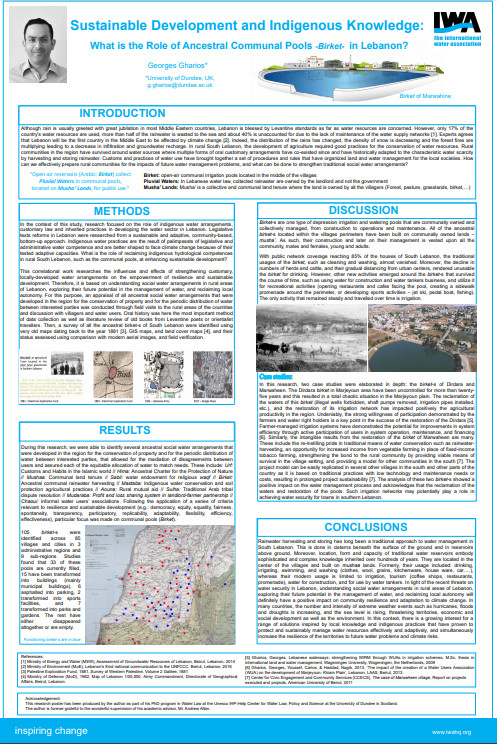Sustainable Development and Indigenous Knowledge: What is the Role of Ancestral Communal Pools -Birket- in Lebanon
 |
affiche, aide visuelle Oct 2019 ; 1 pages
Aut. Georges Gharios
Ed. IWA - London
Téléchargeable sous format: PdF
Abstract:
Although rain is usually greeted with great jubilation in most Middle Eastern countries, Lebanon is blessed by Levantine standards as far as water resources are concerned. However, only 17% of the country's water resources are used, more than half of the rainwater is wasted to the sea and about 40% is unaccounted for due to the lack of maintenance of the water supply networks [1]. Experts agrees that Lebanon will be the first country in the Middle East to be affected by climate change [2]. Indeed, the distribution of the rains has changed, the density of snow is decreasing and the forest fires are multiplying leading to a decrease in infiltration and groundwater recharge. In rural South Lebanon, the development of agriculture required good practices for the conservation of water resources. Rural communities in the region have survived around water sources where multiple forms of oral customary arrangements have co-existed since and have historically adapted to the characteristic water scarcity by harvesting and storing rainwater. Customs and practices of water use have brought together a set of procedures and rules that have organized land and water management for the local societies. How can we effectively prepare rural communities for the impacts of future water management problems, and what can be done to strengthen traditional social water arrangements?
Public-Cible:
Pays concerné: |
Editeur/Diffuseur: |
|
IWA
-
International Water Association - London - Royaume Uni |
En cas de lien brisé, nous le mentionner à communication@pseau.org